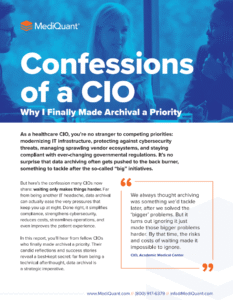Generative AI Underlines Continuing Value of Healthcare Data Archiving Solutions
Written By: Jim Jacobs, President and CEO, MediQuant
An AI platform that turns clinicians notes into structured data within seconds. A virtual assistant that gathers 20,000 nurse handoffs per shift.
AI in healthcare is no longer just hype — it’s actively being implemented to enhance clinical care and operational efficiency. Generative AI offers health systems and hospitals the ability to derive more value from patient claims, monitor payers more closely, equip physicians with useful information at the point of care, and much more.
Driving these advancements, however, requires relevant data — even hospital archive data from 10 or more years ago — that has been normalized and made available to current software. Preserving data in a central repository ensures it’s continually accessible and usable by hospitals to bolster finances, improve workflows, and take better care of patients.
1. Keeping Payer Scorecards for Oversight

2. Recovering Revenue Via Denial Management
3. Helping Physicians at the Point of Care
How Health Data Archiving Enables Data Usefulness
Many hospital executives still imagine an archive at the center of various legacy systems, with arrows pointing from legacy systems to a central repository where information is stored as systems are retired. There are no arrows leading from the repository. In this view, an archive is static, the place where archived data goes to die.
With the rise of generative AI, however, executives are realizing that historic data retains its value for much more than compliance and release-of-information use. While arrows should lead from legacy applications to the data repository, arrows should also emanate from the repository, fueling secondary uses that include billing and collections, patient care, claims management, and medical research.

But not all healthcare data archiving solutions are created equal. For data to be useful for secondary purposes and tactical use cases, it must be discrete, accurate, and reliable — traits that not all archive vendors can meet.
More Thought-Leadership
Protecting the Legal Medical Record: A Critical Risk in Government Health IT Modernization
Kel Pults | Chief Clinical Officer & VP, Government Strategy | November 24, 2025As healthcare IT continues to evolve, the dual forces of interoperability and artificial intelligence (AI) are driving innovation across the industry. Yet, amidst these advancements,...
Protecting Revenue Integrity After System Conversion: The Role of Healthcare Data Archiving
Cindy Adkins CPC, CRCR, CSPPM, Director of Revenue Cycle Solutions, MediQuant | November 17, 2025 | BlogProtecting Revenue Integrity After System Conversion: The Role of Healthcare Data ArchivingFor many health systems, completing a major technology conversion –...
ERP Data Migration Best Practices for Health Systems
As healthcare organizations modernize their infrastructure, ERP data migration becomes a critical step in moving from legacy systems to next-generation platforms. Transferring ERP data involves significant complexity and risk, from compliance concerns and system...
Contact Us Today







